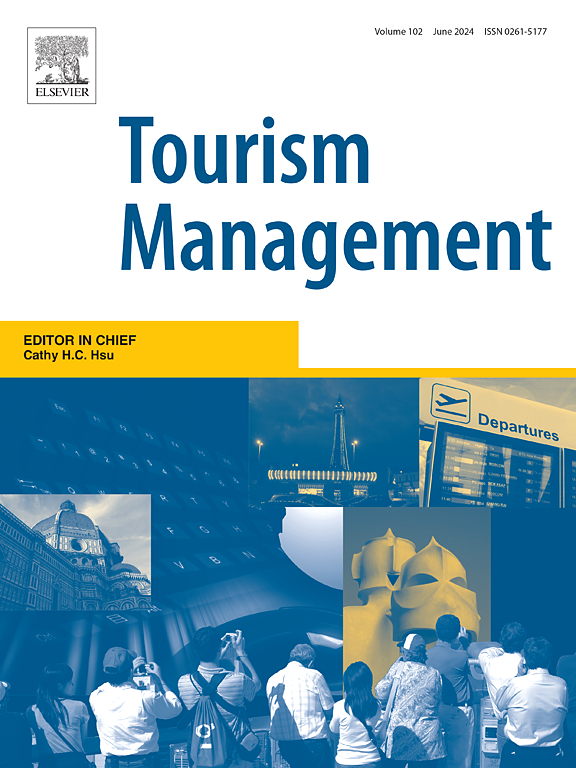Morality expression drives favorable consumer outcomes for P2P tour guide: The role of elevation, trust, and enjoyment
IF 10.9
1区 管理学
Q1 ENVIRONMENTAL STUDIES
引用次数: 0
Abstract
The emerging peer-to-peer platforms enable individual tour guides to market themselves via online profiles. Given the growing societal interest in responsible tourism, tour guides can utilize online profiles to communicate responsible tourism endeavors that showcase positive moral character. However, how consumers respond to such expressions of responsible conduct is unknown. Through four experiments, we find that a moral self-description (vs. social or control) elicited higher elevation, further enhancing trust and enjoyment, leading to more favorable consumer responses (i.e., booking intention, willingness to pay, and likelihood to recommend). Thus, the underlying mechanisms are explained by elevation, trust, and enjoyment. Moreover, consumers' self-esteem and tour guides' motives are two boundary conditions. Specifically, positive reactions to the tour guide's morality expression are more pronounced among high self-esteem individuals and when the guide is intrinsically motivated. This research contributes to the literature on P2P tourism services and offers practical implications for tourism providers.
道德表达促使消费者对 P2P 导游产生好感:提升、信任和乐趣的作用
新兴的点对点平台使导游个人能够通过在线档案推销自己。鉴于社会对负责任旅游的兴趣与日俱增,导游可以利用在线资料宣传负责任的旅游活动,展示积极的道德品质。然而,消费者如何回应这种负责任的行为表现还不得而知。通过四项实验,我们发现道德自我描述(相对于社会描述或控制描述)会引起更高的提升,进一步增强信任感和享受感,从而导致更有利的消费者反应(即预订意向、支付意愿和推荐可能性)。因此,其基本机制是由提升、信任和享受所解释的。此外,消费者的自尊和导游的动机是两个边界条件。具体来说,自尊心强的人和导游有内在动机时,对导游道德表达的积极反应会更明显。这项研究为有关 P2P 旅游服务的文献做出了贡献,并为旅游服务提供商提供了实际启示。
本文章由计算机程序翻译,如有差异,请以英文原文为准。
求助全文
约1分钟内获得全文
求助全文
来源期刊

Tourism Management
Multiple-
CiteScore
24.10
自引率
7.90%
发文量
190
审稿时长
45 days
期刊介绍:
Tourism Management, the preeminent scholarly journal, concentrates on the comprehensive management aspects, encompassing planning and policy, within the realm of travel and tourism. Adopting an interdisciplinary perspective, the journal delves into international, national, and regional tourism, addressing various management challenges. Its content mirrors this integrative approach, featuring primary research articles, progress in tourism research, case studies, research notes, discussions on current issues, and book reviews. Emphasizing scholarly rigor, all published papers are expected to contribute to theoretical and/or methodological advancements while offering specific insights relevant to tourism management and policy.
 求助内容:
求助内容: 应助结果提醒方式:
应助结果提醒方式:


